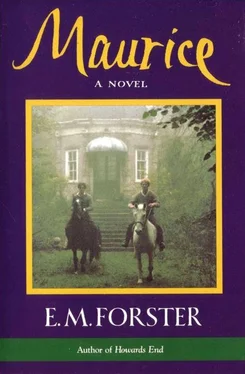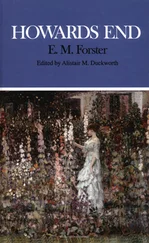"Maurice is a rip really — Waow, you're hurting my head."
"Waow, waow," Ada imitated.
There was a ring at the telephone.
"He has had your wire from the office," announced Kitty. "He wants to know whether you're here."
"Say I am."
"He's coming back tonight, then. Now he wants to talk to you."
Clive took the receiver, but only a burr arrived. They had been disconnected. They could not ring Maurice up as they did not know where he was, and Clive felt relieved, for the approach of reality alarmed him. He was so happy being bandaged: his friend would arrive soon enough. Now Ada bent over him. He saw features that he knew, with a light behind that glorified them. He turned from the dark hair and eyes to the unshadowed mouth or to the curves of the body, and found in her the exact need of his transition. He had seen more seductive women, but none that promised such peace. She was the compromise between memory and desire, she was the quiet evening that Greece had never known. No argument touched her, because she was tenderness, who reconciles present with past. He had not supposed there was such a creature except in Heaven, and he did not believe in Heaven. Now much had become possible suddenly. He lay looking into her eyes, where some of his hope lay reflected. He knew that he might make her love him, and the knowledge lit him with temperate fire. It was charming — he desired no more yet, and his only anxiety was lest Maurice should arrive, for a memory should remain a memory. Whenever the others ran out of the room to see whether that noise was the car, he kept her with him, and soon she understood that he wished this, and stopped without his command.
"If you knew what it is to be in England!" he said suddenly.
"Is Greece not nice?"
"Horrible."
She was distressed and Clive also sighed. Their eyes met.
"I'm so sorry, Clive."
"Oh, it's all over."
"What exactly was it —"
"Ada, it was this. While in Greece I had to reconstruct my life from the bottom. Not an easy task, but I think I've done it."
"We often talked of you. Maurice said you would like Greece."
"Maurice doesn't know — no one knows as much as you! I've told you more than anyone. Can you keep a secret?"
"Of course."
Clive was nonplussed. The conversation had become impossible. But Ada never expected continuity. To be alone with Clive, whom she innocently admired, was enough. She told him how thankful she was he had returned. He agreed, with vehemence. "Especially to return here."
"The car!" Kitty shrieked.
"Don't go!" he repeated, catching her hand.
"I must — Maurice —"
"Bother Maurice." He held her. There was a tumult in the hall. "Where's he gone?" his friend was roaring. "Where've you put him?"
"Ada, take me a walk tomorrow. See more of me… That's settled."
Her brother burst in. Seeing the bandages, he thought there had been an accident, then laughed at his mistake. "Come out of that, Clive. Why did you let them? I say, he looks well. You look well. Good man. Come and have a drink. I'll unpick you. No, girls, not you." Clive followed him, but, turning, had an imperceptible nod from Ada.
Maurice looked like an immense animal in his fur coat. He slipped it off as soon as they were alone, and came up smiling. "So you don't love me?" he challenged.
"All that must be tomorrow," said Clive, averting his eyes.
"Quite so. Have a drink."
"Maurice, I don't want a row."
"I do."
He waved the glass aside. The storm must burst. "But you mustn't talk to me like this," he continued. "It increases my difficulties."
"I want a row and I'll have it." He came in his oldest manner and thrust a hand into Clive's hair. "Sit down. Now why did you write me that letter?"
Clive did not reply. He was looking with growing dismay into the face he had once loved. The horror of masculinity had returned, and he wondered what would happen if Maurice tried to embrace him.
"Why? Eh? Now you're fit again, tell me."
"Go off my chair, and I will." Then he began one of the speeches he had prepared. It was scientific and impersonal, as this would wound Maurice least. "I have become normal — like other men, I don't know how, any more than I know how I was born. It is outside reason, it is against my wish. Ask any questions you like. I have come down here to answer them, for I couldn't go into details in my letter. But I wrote the letter because it was true."
"True, you say?"
"Was and is the truth."
"You say that you care for women only, not men?"
"I care for men, in the real sense, Maurice, and always shall."
"All that presently."
He too was impersonal, but he had not got off the chair. His fingers remained on Clive's head, touching the bandages, his mood had changed from gaiety to quiet concern. He was neither angry nor afraid, he only wanted to heal, and Clive, in the midst of repulsion, realized what a triumph of love was ruining, and how feeble or how ironical must be the power that governs Man.
"Who made you change?"
He disliked the form of the question. "No one. It was a change in me merely physical." He began to relate his experiences.
"Evidently the nurse," said Maurice thoughtfully. "I wish you had told me before… I knew something had gone wrong and thought of several things, but not this. One oughtn't to keep secrets, or they get worse. One ought to talk, talk, talk — provided one has someone to talk to, as you and I have. If you'd have told me, you would have been right by now."
"Why?"
"Because I should have made you right."
"How?"
"You'll see," he said smiling.
"It's not the least good — I've changed."
"Can the leopard change his spots? Clive, you're in a muddle. It's part of your general health. I'm not anxious now, because you're well otherwise, you even look happy, and the rest must follow. I see you were afraid to tell me, lest it gave me pain, but we've got past sparing each other. You ought to have told me. What else am I here for? You can't trust anyone else. You and I are outlaws. All this" — he pointed to the middle-class comfort of the room — "would be taken from us if people knew."
He groaned. "But I've changed, I've changed."
We can only interpret by our experiences. Maurice could understand muddle, not change. "You only think you've changed," he said, smiling. "I used to think I had when Miss OI-cott was here, but it all went when I returned to you."
"I know my own mind," said Clive, getting warm and freeing himself from the chair. "I was never like you."
"You are now. Do you remember how I pretended —"
"Of course I remember. Don't be childish."
"We love each other, and know it. Then what else —"
"Oh, for God's sake, Maurice, hold your tongue. If I love anyone it's Ada." He added, "I take her at random as an example."
But an example was the one thing Maurice could realize. "Ada?" he said, with a change of tone.
"Only to prove to you the sort of thing."
"You scarcely know Ada."
"Nor did I know my nurse or the other women I've mentioned. As I said before, it's no special person, only a tendency."
"Who was in when you arrived?"
"Kitty."
"But it's Ada, not Kitty."
"Yes, but I don't mean — Oh, don't be stupid!"
"What do you mean?"
"Anyhow, you understand, now," said Clive, trying to keep impersonal, and turning to the comforting words with which his discourse should have concluded. "I've changed. Now I want you to understand too that the change won't spoil anything in our friendship that is real. I like you enormously — more than any man I've ever met" (he did not feel this as he said it) "I most enormously respect and admire you. It's character, not passion, that is the real bond."
"Did you say something to Ada just before I came in? Didn't you hear my car come up? Why did Kitty and my mother come out and not you? You must have heard my noise. You knew I flung up my work for you. You never talked to me down the telephone. You didn't write or come back from Greece. How much did you see of her when you were here before?"
Читать дальше












